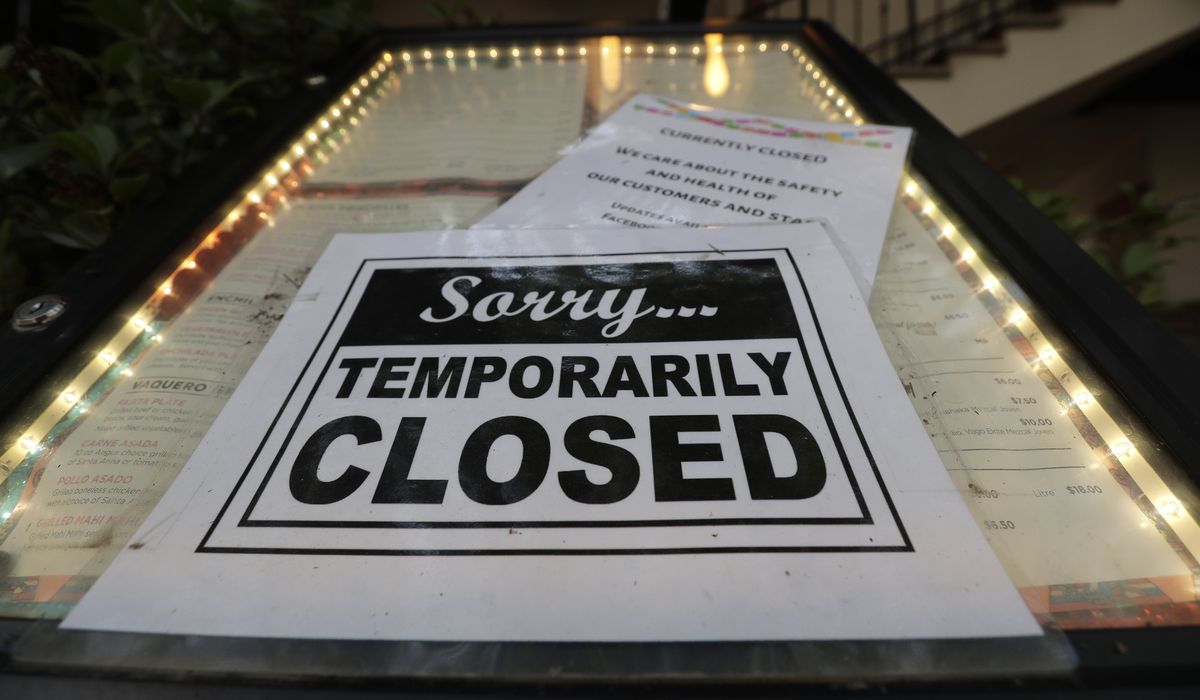Billions of dollars are at stake as insurance companies clash with business owners across the country over covering losses caused by the COVID-19 pandemic, including lost income from the economic shutdown.
Insurers have been rejecting a flood of the business interruption claims from restaurants, bars, casinos, child care centers and others shuttered by government orders, and the businesses are retaliating with a wave of lawsuits.
The fight is expected to be one of the largest areas of litigation stemming from the COVID-19 crisis.
Business owners say they have paid into their insurance plans for years, but now, when a public health disaster hits their businesses, they are not able to reap any return.
“It’s just too much money involved here and too much damage to these folks. Many of them have paid premiums for 20 to 25 years and then get shut down and they want to know what they paid for,” said Gary Logsdon, a Kentucky lawyer.
Mr. Logsdon has as potential clients more than three dozen child care centers whose insurance claims have been routinely denied.
President Trump has expressed sympathy for businesses caught in the coronavirus insurance trap.
“When they finally need it, the insurance company says, ‘We’re not going to give it.’ We can’t let that happen,” he said at a recent briefing with the White House coronavirus task force.
But what the president and Congress are willing to do about the problem remains an open question.
Senate Majority Leader Mitch McConnell, Kentucky Republican, secured more than $67 million for child care providers in his state in the latest economic rescue package, but that might not be enough.
Melanie Barker, the owner of ABC Children’s Academy in Bowling Green, said she fears the federal money won’t last through the duration of the shutdown.
She is one of the business owners working with Mr. Logsdon, who is preparing to go to court if the insurance companies don’t pay up.
The March 20 stay-at-home order imposed by Kentucky Gov. Andy Beshear, a Democrat, forced ABC Children’s Academy and dozens of other day care centers to close. Ms. Barker filed a claim with West Bend Insurance Co.
The company said she could recover for business losses only if she could prove there was a COVID-19 case on the premises and she had to close as a result, Ms. Barker said.
“There was no testing,” she said, noting the limited availability of testing. “How do I know if the ‘communicable disease’ was present in my facility? Better yet, how does the insurance company know that the ‘communicable disease’ was not present in my facility?”
West Bend did not respond to The Washington Times’ questions about COVID-19 claim denials.
The insurance industry says business interruption claims typically do not include pandemics and shouldn’t be altered to do so.
If they did, estimated claim payouts just for businesses with fewer than 100 employees could cost as much as $383 billion each month the businesses are closed, said David Sampson, president of the American Property Casualty Insurance Association.
That could bankrupt the insurance industry.
“Any action to fundamentally alter business interruption provisions specifically, or property insurance generally, to retroactively mandate insurance coverage for viruses by voiding those exclusions, would immediately subject insurers to claim payment liability that threatens solvency and the ability to make good on the actual promises made in existing insurance policies,” he said in a statement.
Each state has an insurance commission that regulates the industry. Ms. Barker and others in similar situations want them to step in and tell insurers that they must pay.
Most business insurance contracts have similar language regardless of the type of business.
Thomas Keller, a chef who owns restaurants across the country including The French Laundry in California’s Napa Valley, sued his insurer for not covering the coronavirus closure. He said the lawsuit aims to set a legal precedent for business owners to recover lost profits during a pandemic.
Mr. Keller is not alone. GCDC, a grilled cheese bar in the District of Columbia, filed a class-action lawsuit in federal court, too.
Casinos in Oklahoma also are seeking to recover lost revenue. The Chickasaw and Choctaw nations are seeking judicial orders declaring that their business losses should be covered.
Brian Fitzpatrick, a law professor at Vanderbilt University who wrote “The Conservative Case for Class Actions,” said parties shouldn’t wait for the government to come to the rescue.
“Private citizens represented by private lawyers can hold companies accountable on their own simply by going to court! Whether these suits will succeed is another matter,” Mr. Fitzpatrick wrote in an email.
The cases will hinge on the language of the insurance contracts.
“But one note of hope: Because the insurance companies draft the contracts, any ambiguity in the contract will be interpreted against them and in favor of policyholders according to a long-standing principle of contract law,” Mr. Fitzpatrick said.






